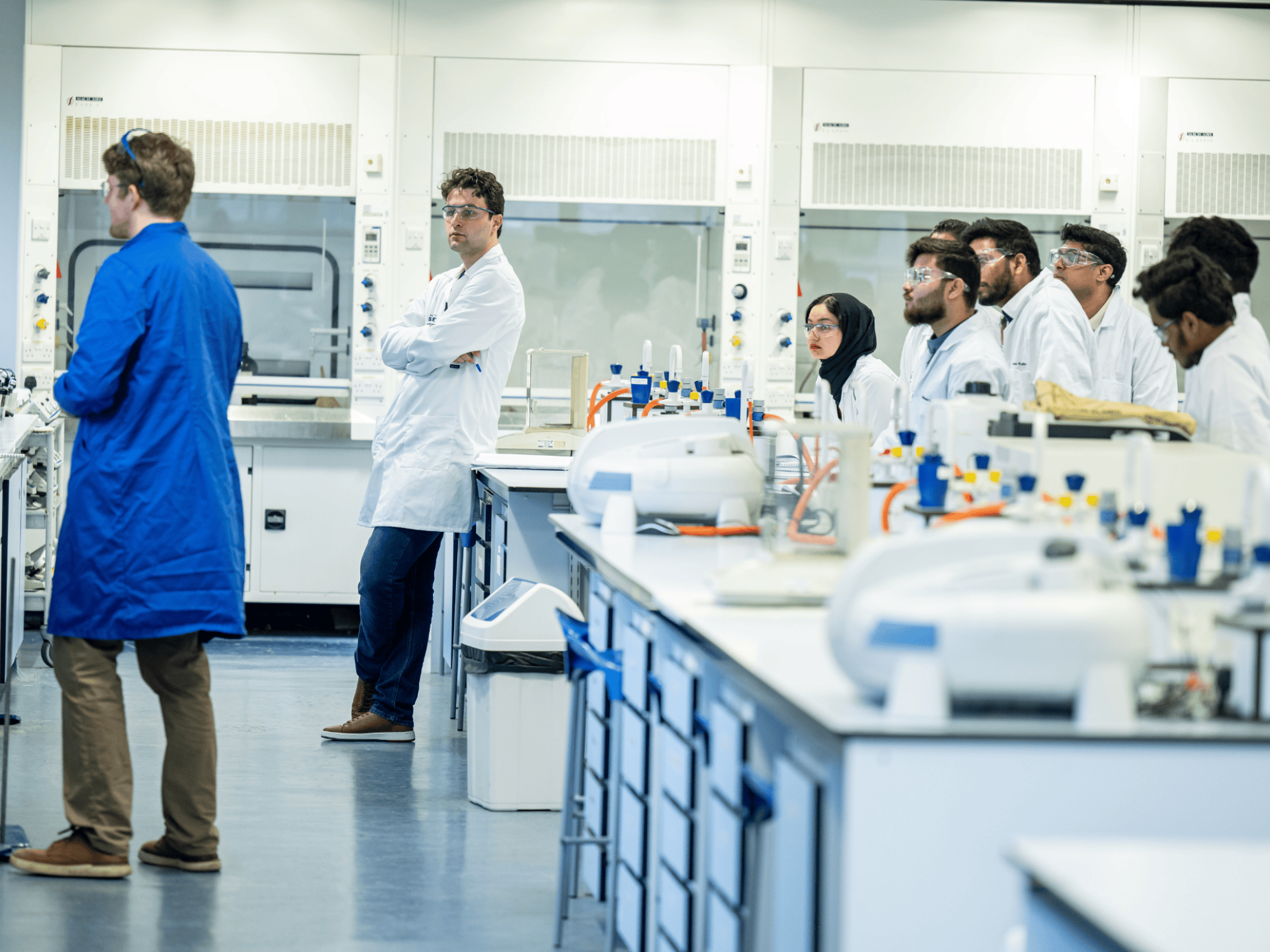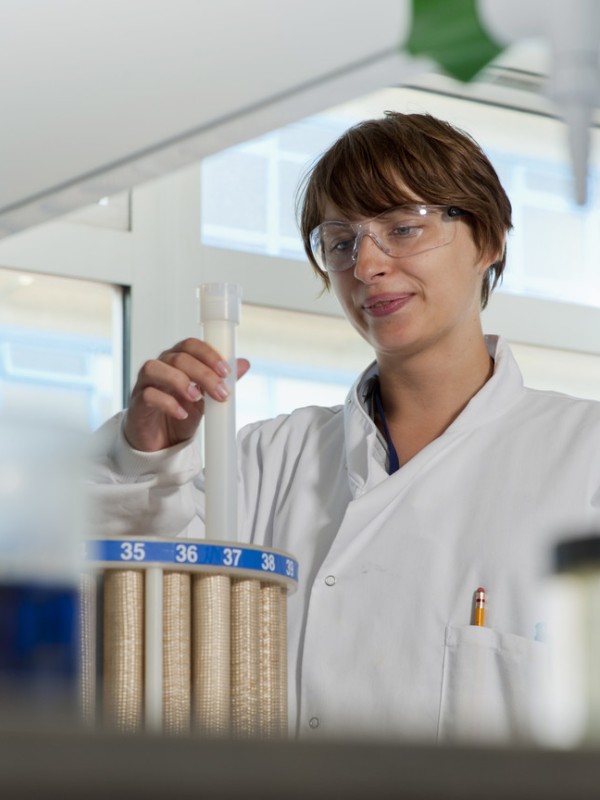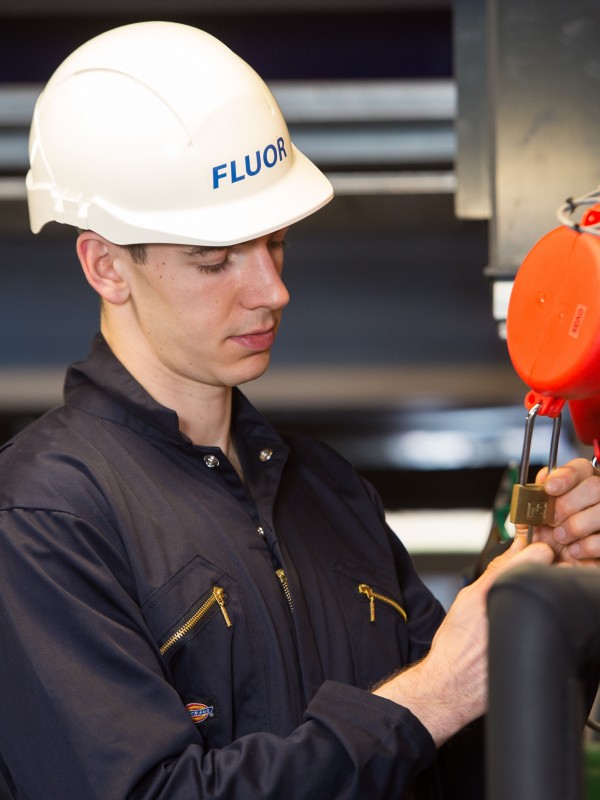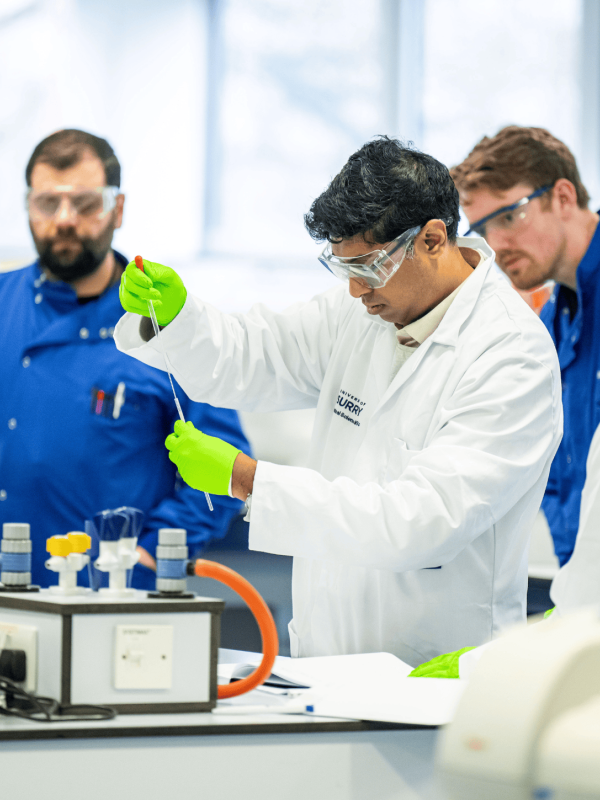
- Pharmaceutical Sciences with Industrial Practice
MSc — 2025 entry Pharmaceutical Sciences with Industrial Practice
Our Pharmaceutical Sciences with Industrial Practice MSc explores the life of medicine, from drug discovery to manufacture and quality control. This two-year programme enables you to study full-time for one year, followed spending some time working in industry with an organisation of your choice.
Why choose
this course?
On this course, you’ll be immersed in the development of world-class medicine, benefiting from hands-on learning in dedicated laboratory facilities. Throughout your studies, you’ll learn from industry experts to gain a comprehensive understanding of the developments and challenges of the global pharmaceutical industry.
Employability is at the core of this programme. At Surrey, you’ll develop specialist theoretical knowledge and exceptional laboratory skills that will prepare you for a successful career in industry or further study. On your year in industry, you’ll also benefit from professional training opportunities through our renowned network of 2300+ partner organisations.
Please note: Applications may close early if the programme reaches capacity.
95 per cent of the University of Surrey’s postgraduate students go on to work or further study*.
* Graduate Outcomes 2024, HESA
What you will study
The programme prepares you to become a highly effective practitioner in areas at the forefront of pharmaceutical knowledge. We’ll support you to develop a breadth of knowledge of the pharmaceuticals process, and its application to industry. Through problem-based learning, you’ll develop an ability to work in multiple settings and have the independent thinking skills to respond to different challenges.
Modules cover the life of pharmaceuticals, from Drug Design and Discovery, Formulation and Manufacture to Quality Control. You will complete a laboratory-based research project in our world-class facilities and learn from specialist module content focusing on current knowledge and industrial standards in the pharmaceutical field. You will develop the skills to interrogate and integrate diverse sources of scientific literature, to design and develop methods for investigation and analysis.
Facilities
Digital literacy and capabilities are key tools of the pharmaceutical industry. This programme will equip you with the knowledge to meet these needs, working with a wide variety of software; for driving analytical equipment and formulation instrumentation, data evaluation, statistical analysis, remote access of the instruments, molecular modelling and more.
You will benefit from our excellent laboratory facilities. Your carefully designed laboratory-based learning sessions will recreate real-life situations, imbuing you with invaluable practical experience.
The structure of our programmes follows clear educational aims that are tailored to each programme. These are all outlined in the programme specifications which include further details such as the learning outcomes:
Modules
Modules listed are indicative, reflecting the information available at the time of publication. Modules are subject to teaching availability, student demand and/or class size caps.
The University operates a credit framework for all taught programmes based on a 15-credit tariff, meaning all modules are comprised of multiples of 15 credits, up to a maximum of 120 credits.
Course options
Year 1
Semester 1
Compulsory
The purpose of this module is to provide students with a fundamental understanding of modern pharmaceutical technologies, their concepts, importance, advantages and challenges. In addition, regulations surround the manufacturing process and the use of advanced digital developments (Continuous Manufacturing) and monitoring (Process Analytical technologies (PAT)) to assure quality is built (Quality by Design (QbD)) into the product during the manufacturing process. This module develops the key knowledge and skills related to the production of pharmaceuticals and is the foundation for many science projects associated with this degree.
View full module detailsThe purpose of this module is to provide students with the most up-to-date knowledge and advanced understanding of the conceptual frameworks underpinning pharmaceutical formulations. In this module, a wide range of formulation approaches will be presented and discussed. Examples are the use of nanoparticles, microneedles, and transdermal patches as modes of delivery of APIs. Use of less traditional routes of drug administration such as buccal, transdermal, and pulmonary drug delivery systems. Development of novel medical devices. The module will also emphasise and demonstrate the vital use of computer modelling and artificial intelligence (AI) in the development of novel dosage forms to enhance the effectiveness of medications.
View full module detailsSemester 2
Compulsory
The purpose of this module is to provide a systematic understanding of the physicochemical properties of API, drug action, metabolisms, toxicology effect of drugs, excipients and degradation products as well as methods used to evaluate potential drug candidates and their synthesis. Knowledge obtained in this module will be vital for understanding the overall impact of pharmaceutical sciences as well as how modern technologies, IT and artificial intelligence can work together to develop and deliver safe and effective medicines to patients.
View full module detailsThe purpose of this module is to give students a fundamental understanding of the conceptual frameworks underpinning pharmaceutical analysis. A wide range of analytical techniques will be presented to students which are broadly divided into those used in pharmaceutical quality control and those dedicated to drug discovery, drug design and formulation. Furthermore, a range of laboratory experiments are designed to develop Good Laboratory Practice (GLP) amongst students and expose them to a number of major analytical tools used in pharmaceutical sciences. Information obtained in this module closely relates to all other modules on the study programme and together they provide a full picture of the life of pharmaceuticals from drug discovery via drug design, and drug manufacture to drug release on the market. This module provides the necessary knowledge of analytical tools and approaches used to critically evaluate the drug development life cycle to enable the development of safe and effective medicines.
View full module detailsThis module is the pinnacle of the learning journey for MSc students and is intended to allow MSc students to put all their knowledge learned so far to use in an extended practical project. Students work in the research groups of one of the academic staff and carry out independent research leading to the production of a dissertation. Students will engage with leading research topics in the scientific area relevant to their discipline. Therefore, this module will promote deeper learning and develop their ability to conduct independent research i.e. define the depth of their knowledge. The work must be of MSc standard and requires a critical appraisal of the work and literature.
View full module detailsSemester 1 & 2
Compulsory
This module provides information, guidance and support for developing the student’s employability. In addition, this module helps students build on their previous skills and generate documents that are required to demonstrate their skill sets to external parties, recruiters and recruiting agencies. Furthermore, skills acquired in this module will enable students to actively participate in placement and employment searches.
View full module detailsThis module provides a portfolio of professional development appropriate to the expectations of the graduate’s technical discipline. The module will include developing the ability to interrogate theoretical knowledge learned at the university with applied professional skills and maximise the potential to succeed in the global job market. The Industrial placement is an excellent opportunity to explore and practice reflective and experiential learning by promoting reflection on the development of professional skills and critical thinking about the ways to improve these. Reflection, critical thinking, and analytical skills will be developed during the placement and while writing the report.
View full module detailsAcross academic years
Compulsory
This module provides information, guidance and support for developing the student’s employability. In addition, this module helps students build on their previous skills and generate documents that are required to demonstrate their skill sets to external parties, recruiters and recruiting agencies. Furthermore, skills acquired in this module will enable students to actively participate in placement and employment searches.
View full module detailsOptional modules for Year 1 (full-time with placement - 2 years) - FHEQ Level 7
Year 2
Across academic years
Compulsory
This module provides a portfolio of professional development appropriate to the expectations of the graduate’s technical discipline. The module will include developing the ability to interrogate theoretical knowledge learned at the university with applied professional skills and maximise the potential to succeed in the global job market. The Industrial placement is an excellent opportunity to explore and practice reflective and experiential learning by promoting reflection on the development of professional skills and critical thinking about the ways to improve these. Reflection, critical thinking, and analytical skills will be developed during the placement and while writing the report.
View full module detailsTeaching and learning
We have a research-led focus to our teaching, ensuring that everything you learn is up-to-date and relevant to employers. You’ll be taught by lecturers who are active researchers in their respective fields. These may include:
- Dr Milan Antonijevic, expert in pharmaceutical analysis and the use of thermal analytical techniques to study pharmaceutically important molecules. Dr Antonijevic has extensive experience working in quality assurance and quality control for the pharmaceutical industry.
- Professor Adrian Dobbs, an expert in the development of new synthetic methodologies.
- Professor Tao Chen, a computational and data scientist, working on digital technologies for chemical engineering applications.
- Professor Charley Wu, an expert researcher who has run industrial collaborative research projects with Pfizer, AstraZeneca, MSD and Sanofi in development of advanced numerical modelling techniques for pharmaceutical application.
- Dr Lian Liu, an expert in particle technology and formulations for health applications.
General course information
Contact hours
Contact hours can vary across our modules. Full details of the contact hours for each module are available from the University of Surrey's module catalogue. See the modules section for more information.
Timetable
Course timetables are normally available one month before the start of the semester.
New students will receive their personalised timetable in Welcome Week, and in subsequent semesters, two weeks prior to the start of semester.
Please note that while we make every effort to ensure that timetables are as student-friendly as possible, scheduled teaching can take place on any day of the week (Monday – Friday). Wednesday afternoons are normally reserved for sports and cultural activities. Part-time classes are normally scheduled on one or two days per week, details of which can be obtained from Academic Administration.
Location
This course is based at Stag Hill campus. Stag Hill is the University's main campus and where the majority of our courses are taught.
We offer careers information, advice and guidance to all students whilst studying with us, which is extended to our alumni for three years after leaving the University.
On this course you will gain the knowledge and experience required to meet the needs of pharmaceutical companies, ranging from global leaders to small enterprises and contract laboratories.
Graduates could go on to roles including formulation development, manufacturing, quality control of the major pharma industries and small and medium-sized enterprises, as well as development of healthcare products and consumer goods in related industries and contract laboratories.
As well as being designed to meet the needs of future employers, this programme will give you a solid foundation to pursue further study in pharmaceutical sciences or scientific research.
UK qualifications
A minimum of a 2:2 UK honours degree or a recognised equivalent international qualification, in pharmaceutical sciences, pharmacy or chemistry. Other closely related degree subjects with relevant pharmaceutical knowledge/modules may also be considered, for example, chemical engineering and pharmacology, these cases will be referred to the programme director to review.
English language requirements
IELTS Academic: 6.5 overall with 6.0 in writing and 5.5 in each other element.
These are the English language qualifications and levels that we can accept.
If you do not currently meet the level required for your programme, we offer intensive pre-sessional English language courses, designed to take you to the level of English ability and skill required for your studies here.
Placements
Our two-year MSc Pharmaceutical Sciences with professional placement year enables you to spend time working in industry.
After a year of full-time study at Surrey you'll be able to spend up to an additional 12 months gaining professional work experience with an organisation. You'll be responsible for securing your own placement offer(s), however, you'll be supported in your search with a series of employability workshops and benefit from individual coaching.
The University works closely with several potential employers to help facilitate successful placement applications and there are resources setup by the Employability and Careers Centre to assist you.
Scholarships and bursaries
Discover what scholarships and bursaries are available to support your studies.
Fees
Explore UKCISA’s website for more information if you are unsure whether you are a UK or overseas student. View the list of fees for all postgraduate courses.
September 2025 - Full-time (with placement) - 2 years
- UK
- £12,050
- Overseas
- £17,150
- For the two-year full-time with placement course, the fee stated above will be charged in Year 1 of the programme and a fee of £1,850 is payable in Year 2 of the programme.
- These fees apply to students commencing study in the academic year 2025-26 only. Fees for new starters are reviewed annually.
Payment schedule
- Students with Tuition Fee Loan: the Student Loans Company pay fees in line with their schedule (students on an unstructured self-paced part-time course are not eligible for a Tuition Fee Loan).
- Students without a Tuition Fee Loan: pay their fees either in full at the beginning of the programme or in two instalments as follows:
- 50% payable 10 days after the invoice date (expected to be October/November of each academic year)
- 50% in January of the same academic year.
- Students on part-time programmes where fees are paid on a modular basis: cannot pay fees by instalment.
- Sponsored students: must provide us with valid sponsorship information that covers the period of study.
The exact date(s) will be on invoices.
Apply online
To apply online first select the course you'd like to apply for then log in.
Select your course
Choose the course option you wish to apply for.
Sign in
Create an account and sign into our application portal.
Please note that we may have to close applications before the stated deadline if we receive a high volume of suitable applications. We advise you to submit your application as soon as it is ready.
ApplyAdmissions information
Once you apply, you can expect to hear back from us within 14 days. This might be with a decision on your application or with a request for further information.
Our code of practice for postgraduate admissions policy explains how the Admissions team considers applications and admits students. Read our postgraduate applicant guidance for more information on applying.
About the University of Surrey
Need more information?
Contact our Admissions team or talk to a current University of Surrey student online.
Terms and conditions
When you accept an offer to study at the University of Surrey, you are agreeing to follow our policies and procedures, student regulations, and terms and conditions.
We provide these terms and conditions in two stages:
- First when we make an offer.
- Second when students accept their offer and register to study with us (registration terms and conditions will vary depending on your course and academic year).
View our generic registration terms and conditions (PDF) for the 2024/25 academic year, as a guide on what to expect.
Disclaimer
This online prospectus has been published in advance of the academic year to which it applies.
Whilst we have done everything possible to ensure this information is accurate, some changes may happen between publishing and the start of the course.
It is important to check this website for any updates before you apply for a course with us. Read our full disclaimer.








